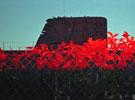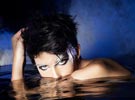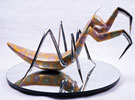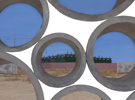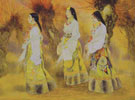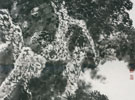贾奈娜•查普
血,海
四频录像装置
2004
Janaina Tschäpe
Blood, Sea
4-screen video installation
2004
关于贾奈娜•查普作品《血,海》的创作灵感
节选自伊泰洛·卡尔维诺《时间零》
生命尚未出现时的海洋环境并没有因为后来细胞的诞生及其漫长的生物进化到人的出现而发生巨大的变化。最初起源于始生纪海浪里的细胞,与在人类的动脉里流淌的细胞并无二致。海洋为第一个活细胞和第一个多细胞生物的诞生提供了氧气和其他构成生命的必要物质。事实上,我们血液的化学构成和生命的发源地海洋非常相似。随着日趋复杂的生物进化,如何维持最大量的细胞与液体环境接触的问题已经无法仅仅依靠扩张外表面来解决:具有中空结构的生物体由于可以吸纳海水而占据了优势。但是,只有当这种具空腔结构生物体的分裂活动进入血液循环的系统,才能实现氧气的输送进而保证多元细胞的进化,由此才使得今天的地球生态成为可能。曾经孕育生命的海洋,如今正在这些生命的身体内部。
About the inspiration for Blood, Sea by Janaina Tschpe
Excerpts From t zero by Italo Calvino
The conditions that obtained when life had not yet emerged from the oceans have not subsequently changed a great deal for the cells of the human body, bathed by the primordial wave which continues to flow in the arteries. Our blood in fact has a chemical composition analogous to that of the sea of our origins, from which the first living cells and the first multicellular beings derived the oxygen and the other elements necessary to life. With the evolution of more complex organisms, the problem of maintaining a maximum number of cells in contact with the liquid environment could not be solved simply by the expansion of the exterior surface: those organisms endowed with hollow structures, into which the sea water could flow, found themselves at an advantage. But it was only with the ramification of these cavities into a system of blood circulation that distribution of oxygen was guaranteed to the complex of cells, thus making terrestrial life possible. The sea where living creatures were at one time immersed is now enclosed within their bodies.


